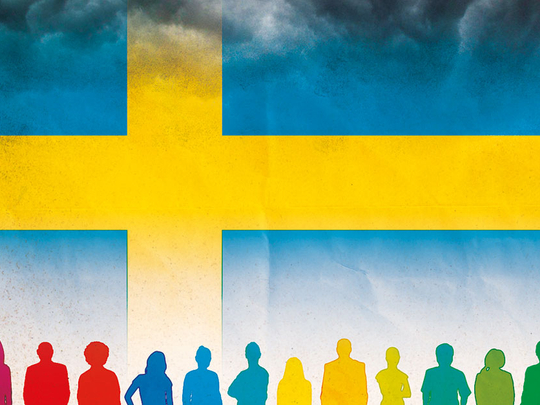
Sweden’s general election is just a month away, and the deputy speaker of the Swedish parliament has this summer repeated his claim that Jewish and Sami people are not Swedes. Bjorn Soder, of the far-right Sweden Democrats party — which is currently polling at a record 20 per cent, just behind the ruling Social Democrats — first made the claim in a newspaper interview four years ago.
Soder was the party secretary of the Sweden Democrats for 10 years. To explain his claim, he tries to refer to the fact that both Jews and Sami (the latter an indigenous ethnic group spread across the northern part of Scandinavia) are recognised by law as two of Sweden’s five national minorities. “These groups have a minority position just because they aren’t Swedish,” he wrote.
It is perfectly possible to be both Swedish and Jewish. The periods in history when this didn’t work so well — in Sweden or elsewhere — were those when European politicians of the Soder sort excluded people on the basis of shady notions of “the other” and of “belonging”.
My own family had come to Sweden for that very reason. In 1968, my mother had to flee her native Poland. The regime in Warsaw orchestrated an extensive antisemitic campaign. A climate of hatred took hold. Throughout her life, my mother considered herself Polish. Poland was her homeland. But suddenly the authorities saw her as part of a fifth column, and forced her to renounce her citizenship. Sweden held out, opening arms at the time. My mother started a new life and became a Swedish citizen. Nobody questioned her national identity.
Yet, it’s true that a political tradition of exclusion did once exist in Sweden. At the beginning of the 20th century, the political mood in the country was very different, as the historian Lars Andersson recalls in his thesis on anti-Semitism in Sweden before the Second World War. Anti-Semitic representations and stereotypes were part of the creation of modern Sweden’s cultural and national identity, and the way ‘Swedishness’ was constructed.
Soder’s party was founded in 1988 by veterans of Swedish pro-Nazi and fascist groups. Such extremism is not unique to Sweden. Soder cares little for the real reasons why Swedish legislation confers a minority status to some groups — and those reasons have nothing to do with his agenda. The idea originated in recommendations made in the 1990s by the Council of Europe — which, following the collapse of the Soviet Union, made significant efforts to ensure that minorities across Europe would receive adequate legal protection. The past was full of horrors.
New conventions were adopted, and member states were expected to act. Lennart Rohdin, then the Swedish minister working on these issues, explained in an interview that “we could not, with credibility, urge Moldova’s foreign minister, for example, to sign those conventions if we didn’t do so ourselves”. He added: “We sneaked into this a little reluctantly, it was something we had to do.”
The Sweden Democrats know what they want. In the 1990s they were hardly interested in strengthening minority rights. What they have always believed in is pointing out who belongs to the Swedish national “project”, and who doesn’t. Soder’s outlook reflects his party’s obsession with “Swedishness” — who’s in and who should be out.
Mattias Karlsson, the party’s chief ideologist, once said that the “body language” of the country’s most famous footballer, Zlatan Ibrahimovic — his father is a Muslim who fled Bosnia — didn’t come across as Swedish, and neither did the way Ibrahimovic “talks, acts and speaks”. Karlsson has dismissed Soder’s critics as “cosmopolites”. That expression will be familiar to anyone who knows at least a little about the history of anti-Semitism. But Karlsson uses it without blinking.
Jews are not at the top of the list of those the far-right likes to target in Sweden. Soder has a record of expressing sympathy for discrimination against the Roma people. Jimmie Akesson, the leader of the Sweden Democrats, has warned that Muslims may become the majority population in large cities. He describes that prospect as “the biggest foreign threat to Sweden since the Second World War”.
As elsewhere in Europe, the far right may grow; but in Sweden, it will have great difficulty in finding political allies with which to form a governing coalition. I know from my own family’s story that Sweden’s traditions of openness and tolerance can still hold strong.
— Guardian News & Media Ltd
Peter Wolodarski is editor-in-chief of Dagens Nyheter, a Swedish daily newspaper.








